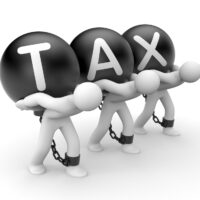Can the IRS Take My Assets During My Bankruptcy?

In the lead-up to making the decision to file for bankruptcy, you may have accrued more than just consumer debt. You may be dealing with unpaid child support or even back taxes that mounted while you were unable to keep up with other bills. We have explained the automatic stay provision of bankruptcy in a previous post. While nearly all creditors are prohibited during your bankruptcy case from trying to collect or even just contact you about a debt they claim you owe, there are exceptions to the protections of the automatic stay for certain types of creditors, such as federal and New York tax authorities. Learn more about how tax collection is affected by bankruptcy’s automatic stay, and speak to our team of Hudson Valley bankruptcy attorneys if you have questions about tax debts in bankruptcy.
When you file your Chapter 7 or Chapter 13 bankruptcy petition, the automatic stay restricts creditors from seeking to collect nearly any debt that you owe at the time of filing. Since your creditors may be receiving only a small portion of what they claim to be owed, the bankruptcy court levels the playing field by ensuring that no creditor is going around the bankruptcy to get payment from you. While the restrictions on tax assessors are not quite as strict as they are on consumer debt collectors, state and local tax authorities are subject to the automatic stay.
While your bankruptcy case is before the court, tax authorities may not call you about any outstanding tax debt, garnish your wages, or seize your property pursuant to a judgment lien they had previously obtained. If you believe you owe a tax debt, it is important that you or your attorney provide notice to the IRS and New York Department of Taxation and Finance to ensure they know about the stay and cease all barred activities during your bankruptcy case. The restrictions on tax authorities do not bar all contact regarding a tax debt, however. While your case is pending, the tax authority may begin or continue an audit, demand that you provide tax returns, provide notice of a tax arrears, demand payment of that arrears, and in some cases, file a lien on property you own.
If you are facing large amounts of consumer debt and believe that you may be a candidate for bankruptcy, contact the seasoned and effective Hudson Valley bankruptcy attorneys at Rusk, Wadlin, Heppner & Martuscello, LLP for a consultation, at 845-236-4411 (Marlboro), or 845-331-4100 (Kingston).
